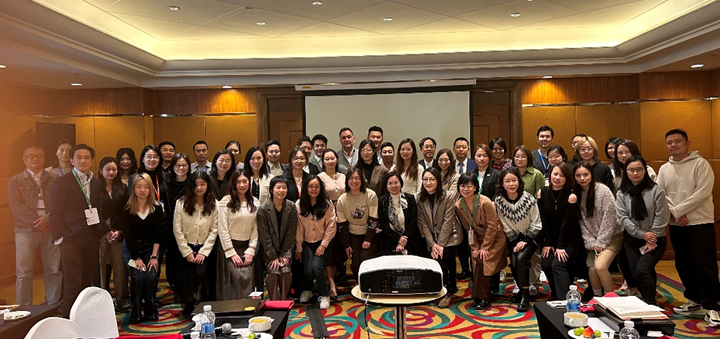
On December 7,QBPC Luxury Goods IWG helda a joint meeting with Sports, Fashion and Lifestyle IWG in Shanghai, which was moderated by Luxury Goods IWG Coordinator Miller Wang and Sports, Fashion and Lifestyle IWG Coordinator Esther Dong. Quan Lv from Red Book, Lunan Zhang from Anta and Lawyer James Luo and Tao Zeng delivered wonderful lectures on four topics, including platform governance, criminal crackdown on new types of online infringement, new challenges of IPR enforcement, as well as IP civil suit collateral to criminal proceedings. More than forty representatives from two IWGs attended this event.
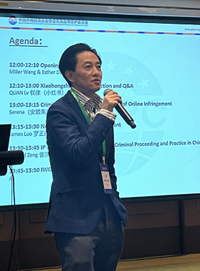
At the beginning of the meeting, Miller Wang thanked members for participating both online and offline, and introduced the speakers.
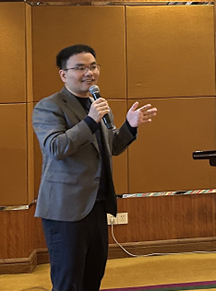
Quan Lv elaborated on the brand protection policies of Red Book. The brand protection work was divided to three approaches, namely proactive treatment, infringement complaint handling, and joint projects with brands, industry associations and related enforcement agencies. After that Quan Lv anwered the questions raised by the audience over the main control mode, the solution for copycat products, and the review process of the brand authorization provided by the store, and conflicts between the use of trademarks and common name.
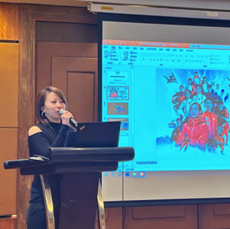
With regard to the theme of "criminal crackdown on new types of online infringement", Lunan Zhang introduced the characteristics and trends of current network infringement, such as gradual separation of various links, changing from static to dynamic, and covert and diverse infringement means. She also put forward that right holders should conduct "pre-judgment analysis, in-depth investigation" in the early stage of the case to fully prepare for the raid. In the process of investigation, they should join efforts with the police and trace the source of fund to break through the stuck point with the overall strategy of "multiple-party cooperation and co-governance" so as to overcome difficulties and achieve a more in-depth and thorough effect of enforcement. The typical cases of online new-type crimes handled by Anta left QBPC members with a deep impression, especially the counterfeit cases involving live studios and Pin Tuantuan, etc.

James Luo then discussed the new challenges in IP Enforcement. Firstly, in order to standardize the IP enforcement of rightholders, Guangzhou Intellectual Property Court issued relevant work guidelines in November. James believed the document was not in line with the spirit of President Xi Jinping’s speech on the construction of foreign-related rule of law, strengthening the protection of IPR and safeguarding the legitimate rights and interests of foreign-funded enterprises. He proposed the members of two IWGs could jointly sent a petition to the Court, emphasizing that the proactive enforcement activities of foreign right holders were not for commercial purpose, and urge the court to reconsider the document. After introducing The Convention of Abolishing the Requirement of Legalization for Foreign Public Documents, which had come into force in China on November 7, 2023, he pointed out that China's accession to the APOSTILLE would greatly streamline the procedures for cross-border circulation of documents, facilitate international economic, trade and personnel exchanges, which would bring about great convenience. Finally, in view of the reduction in the amount of compensation, James mentioned that the amount of compensation awarded by many courts was lower than that before the pandemic, however some courts maintained the previous practice.
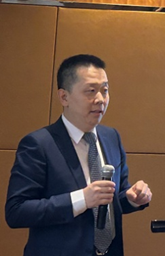
As a member of the project team of "Research on the Legislation and Practical Mechanism of Criminal-Civil Connection of Intellectual Property Rights" approved and established by the Supreme People's Procuratorate in 2023, Dr. Zeng Tao combed the legislative evolution of the system of civil suit collateral to criminal procedure of IP cases in China. He introduced in detail the background for recommending the application of the system in IP criminal procedure in judicial practice, including 1) The practical inertia of criminal before civil procedure made it difficult to compensate the economic loss of the IPR holder in the criminal procedure. 2) It was difficult to establish the legal status of the victim, which prevented right holders from criminal procedure. Therefore an effective defense against the defender could hardly be formed in the criminal procedure. 3) The standards of property disposal such as restitution, the return of illegal gain and fines, etc. were not unified in the IP criminal cases, and the relationship between them and the economic losses of right holders was not clear. 4) In existing judicial practice, there was no consensus on whether the IP economic loss belonged to material loss, resulting in the lack of support by many local procuratorial organs for civil suit collateral to criminal procedure. Tao Zeng made an in-depth analysis of the problems in practice and gave corresponding suggestions.
At the end of the meeting, the two IWGs coordinators thanked everyone for their active participation and looked forward to more joint activities in the future.
